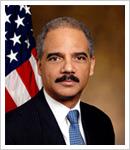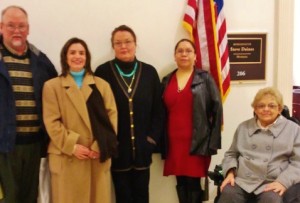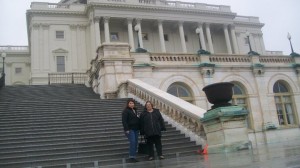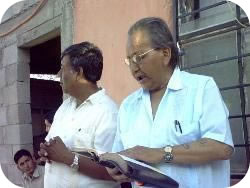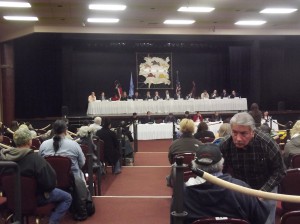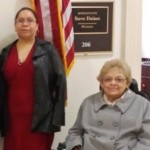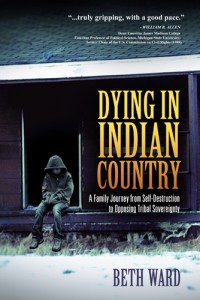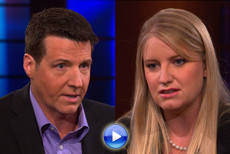This Page is going to be under construction for quite awhile. Please be patient as we allow it to remain online while we work. Although it is no where near in order yet, we know that this information is very important to certain families, so we want them to be able to get what they can as they can…..
back to top
The “existing Indian family doctrine” was first explained in Matter of Adoption Baby Boy L. (Kan., 1982) 643 P.2d 168, which involved an out-of-wedlock child of an Indian father and a non-Indian mother. (In re Alicia S. (1998) 65 Cal.App.4th 79, 83.) The mother had voluntarily relinquished the child at birth for adoption by a specific non-Native American couple, whereupon the father and his tribe invoked the ICWA. In declining to apply ICWA to this situation, the Kansas Supreme Court found that the purposes of the ICWA would not be served by applying it to a situation in which the child had never been a part of an Indian home or culture: “A careful study of the legislative history behind the Act and the Act itself discloses that the overriding concern of Congress and the proponents of the Act was the maintenance of the family and tribal relationships existing in Indian homes and to set minimum standards for the removal of Indian children from, their existing Indian environment. It was not to dictate that an illegitimate infant who has never been a member of an Indian home or culture, and probably never would be, should be removed from its primary cultural heritage and placed in an Indian environment over the express objections of its non-Indian mother.” (Matter of Adoption of Baby Boy L., supra, at p. 175.)
A split of authority has developed between state courts adopting the doctrine, and those declining to do so. Following Kansas’s lead, numerous state courts adopted the “existing Indian family doctrine,” refusing to apply the Act where its purpose, the improper removal of Indian children from their Indian families, would not be served. Other states rejected the doctrine, primarily based on a plain language statutory construction of the Act. According to these courts, a narrow focus on the interests of a particular existing family failed to recognize the broader interests of the Indian tribe in preserving tribal culture.
The single United States Supreme Court case addressing the Act, Mississippi Choctaw Indian Band v. Holyfield (1989) 490 U.S. (Holyfield), involved the question whether twin children, whose parents lived on a reservation and traveled to a distant town to give birth to them and relinquish them, were “domiciled” on the reservation within the meaning of the Act. Some courts have construed Holyfield as having raised questions about the continuing viability of the “existing Indian family doctrine” as defined by Baby Boy L. and its progeny, while other courts have construed Holyfield as being limited to its facts, and having no effect on the “existing Indian family doctrine.”
At present, 10 states have adopted the doctrine, six have rejected it, and the position of the remaining states is unclear. fn. 15
Congress considered amending the ICWA to preclude application of the “existing Indian family doctrine” but did not do so. fn. 16 The United States Supreme Court has denied certiorari in two cases involving the “existing Indian family doctrine,” fn. 17 one from Division Three of this district of the California Court of Appeal, In re Bridget R. (1996) 41 Cal.App.4th 1483 (Bridget R.).
Bridget R., supra, 41 Cal.App.4th at p. 1507.) “It is almost too obvious to require articulation,” the Court commented, ‘”that the unique values of Indian culture’ [citation] will not be preserved in the homes of parents who have become fully assimilated into non-Indian culture.” (Ibid.) Thus, the Court concluded, absent a showing by the parents of significant social, cultural, or political ties with their Indian heritage, applying the ICWA to remove the children from a home in which they had formed familial bonds would violate the children’s substantive due process rights. Under the circumstances of assimilated parents and a child who has become part of a loving family, the ICWA “can serve no purpose which is sufficiently compelling to overcome the child’s fundamental right to remain in the home where he or she is loved and well cared for, with people to whom the child is daily becoming more and more attached by bonds of affection and among whom the child feels secure to learn and grow. (Id. at pp. 1507-1508.)
Bridget R., supra, 41 Cal.App.4th at p. 1508.) The Court rejected the contention that the ICWA does not create a race-based classification because application of the Act triggered by the child’s membership in the Tribe, holding that “any application of ICWA which is triggered by an Indian child’s genetic heritage, without substantial social, cultural or political affiliations between the child’s family and a tribal community, is an application based solely, or at least predominantly, upon race and is subject to strict scrutiny under the equal protection clause. So scrutinized, and for the same reasons set forth in our discussion of the due process issue, it is clear that ICWA’s purpose is not served by an application of the Act to children who are of Indian descent, but whose parents have no significant relationship with an Indian community. If ICWA is applied to such children, such application deprives them of equal protection of the law.” (Bridget R., supra, at pp. 1509-1510.)
A. Substantive Due Process
Family rights are afforded substantive protection under the due process clause of the Fifth and Fourteenth Amendments. (Santosky v. Kramer (1982) 455 U.S. 745, 753.) fn. 23 The United States Supreme Court ‘”has long recognized that freedom of personal choice in matters of marriage and family life is one of the liberties protected by the Due Process Clause of the Fourteenth Amendment.’ [Citation.]” (Moore v. East Cleveland (1977) 431 U.S. 494 499.) As this district of the Court of Appeal discussed in Bridget R., both the United States and California Supreme Courts have recognized that an individual’s rights respecting family relationships do not necessarily depend upon the existence of a biological connection, and that interests in familial ties which grow between members of a de facto family may outweigh biological relationships in some circumstances. (In re Bridget R., supra, 41 Cal.App.4th at p. 1505.)
The United States Supreme Court has issued several opinions establishing that children are constitutionally protected actors. “[N]either the Fourteenth Amendment nor the Bill of Rights is for adults alone.” (In re Gault (1967) 387 U.S. 1, 13.) ‘”Constitutional rights do not mature and come into being magically only when one attains the state-defined age of majority. Minors, as well as adults, are protected by the Constitution and possess constitutional rights.’ [Citation.]” (Troxel v. Granville (2000) 530 U.S. 57, 89, fn. 8 (dis. opn. of Stevens, J.).) fn. 24 While the United States Supreme court has reserved the issue of deciding the nature of a child’s liberty interests in preserving established familial or family-like bonds (Michael H. v. Gerald D. (1989) 491 U.S. 110, 130), our Supreme Court has declared that “[c]hildren . . . have fundamental rights–including the fundamental right . . . to ‘have a placement that is stable, [and] permanent.'” (In re Jasmon O. (1994) 8 Cal.4th 398, 419, quoting from In re Marilyn H., (1993) 5 Cal.4th at p. 306.) California recognizes that “children are not simply chattels belonging to their parent, but have fundamental interests of their own . . . .” (In re Jasmon O. (1994) 8 Cal.4th 398, 419), and that these interests are of constitutional dimension. (In re Bridget R., supra, at p. 1490.) Prior to Marilyn H., Jasmon O., and Bridget R., in In re Arturo A. (1992) 8 Cal.App.4th 229, California case law “[a]dopt[ed] the proposition that a child has a constitutional right to a reasonably directed early life, unmarked by unnecessary and excessive shifts in custody . . . .” (Id. at p. 242, fn. 6.)
As noted in Bridget R., the right of a child to a familial relationship is “[i]f anything, . . . more compelling than adults’, because children’s interests in family relationships comprise more than the emotional and social interests which adults have in family life; children’s interests also include the elementary and wholly practical needs of the small and helpless to be protected from harm and to have stable and permanent homes in which each child’s mind and character can grow, unhampered by uncertainty and fear of what the next day or week or court appearance may bring. [Citation.]” (In re Bridget R., supra, 41 Cal.App.4th at p. 1504.)
Legislation which substantially interferes with the enjoyment of a fundamental right is subject to strict scrutiny (Sherbert v. Verner (1963) 374 U.S. 398), i.e., it must be set aside or limited unless it serves a compelling purpose and is necessary to the accomplishment of that purpose. Thus, application of the ICWA that fundamentally interferes with the Minor’s right to retain his existing stable familial relationships requires that the statute be subjected to strict scrutiny to determine whether, as applied, it serves a compelling government purpose and, if so, whether its application is actually necessary and effective to the accomplishment of that purpose. (In re Bridget R., supra, 41 Cal.App.4th at p. 1507.)
The test we apply is: (1) whether the tribal interests which the ICWA protects are sufficiently compelling under substantive due process standards to justify the impact implementation of ICWA’s placement preferences would have on the Minor’s constitutionally protected familial rights in his de facto family and, if so, (2) whether the application of ICWA, under the facts of this case, is necessary to further that interest. We do not disagree with the proposition that preserving Native-American culture is a significant, if not compelling, governmental interest. We do not, however, see that interest being served by applying the ICWA to a multi-ethnic child who has had a minimal relationship with his assimilated parents, particularly when the tribal interests “can serve no purpose which is sufficiently compelling to overcome the child’s right to remain in the home where he . . . is loved and well cared for, with people to whom the child is daily becoming more attached by bonds of affection and among whom the child feels secure to learn and grow.” (In re Bridget R., supra, 41 Cal.App.4th at p. 1508.)
The Minor is a party (§ 317.5 (b)), represented by counsel charged with advocating his independent interests (§ 317, subds. (c), (e)). He has defined his best interests as remaining with his de facto family.
#1)
In re Santos Y, involving the Minnesota Chippewa Tribe, Grand Portage, the court found that “Application of the ICWA to a child whose only connection with an Indian tribe is a one-quarter genetic contribution does not serve the purpose for which the ICWA was enacted, “to protect the best interests of Indian children and to promote the stability and security of Indian tribes and families” (25 U.S.C. § 1902).” “The analyses pay particular attention to In re Bridget R., and quoted from Bridget R.‘s due process and equal protection analysis at relative length.”
They also said, “We do not disagree with the proposition that preserving Native-American culture is a significant, if not compelling, governmental interest. We do not, however, see that interest being served by applying the ICWA to a multi-ethnic child who has had a minimal relationship with his assimilated parents, particularly when the tribal interests “can serve no purpose which is sufficiently compelling to overcome the child’s right to remain in the home where he . . . is loved and well cared for, with people to whom the child is daily becoming more attached by bonds of affection and among whom the child feels secure to learn and grow.” (In re Bridget R., supra, 41 Cal.App.4th at p. 1508.)”
Finally, Santos states, Congress considered amending the ICWA to preclude application of the “existing Indian family doctrine” but did not do so.”
#2)
In re Santos Y (2001), the court found that “Application of the ICWA to a child whose only connection with an Indian tribe is a one-quarter genetic contribution does not serve the purpose for which the ICWA was enacted…” Santos y paid particular attention to In re Bridget R., and quoted from Bridget R.‘s due process and equal protection analysis at length.
They also said, “We do not disagree with the proposition that preserving Native-American culture is a significant, if not compelling, governmental interest. We do not, however, see that interest being served by applying the ICWA to a multi-ethnic child who has had a minimal relationship with his assimilated parents, particularly when the tribal interests “can serve no purpose which is sufficiently compelling to overcome the child’s right to remain in the home where he . . . is loved and well cared for, with people to whom the child is daily becoming more attached by bonds of affection and among whom the child feels secure to learn and grow.” (In re Bridget R., supra, 41 Cal.App.4th at p. 1508.)”
Holyfield – the first case in which the federal high court has construed ICWA,
[ Footnote 8 ] The explanation of this subsection in the House Report reads as follows: “Subsection (b) directs a State court, having jurisdiction over an Indian child custody proceeding to transfer such proceeding, absent good cause to the contrary, to the appropriate tribal court upon the petition of the parents or the Indian tribe. Either parent is given the right to veto such transfer. The subsection is intended to permit a State court to apply a modified doctrine of forum non conveniens, in appropriate cases, to insure [490 U.S. 30, 61] that the rights of the child as an Indian, the Indian parents or custodian, and the tribe are fully protected.” Id., at 21. In commenting on the provision, the Department of Justice suggested that the section should be clarified to make it perfectly clear that a state court need not surrender jurisdiction of a child custody proceeding if the Indian parent objected. The Department of Justice letter stated: “Section 101(b) should be amended to prohibit clearly the transfer of a child placement proceeding to a tribal court when any parent or child over the age of 12 objects to the transfer.” Id., at 32. Although the specific suggestion made by the Department of Justice was not in fact implemented, it is noteworthy that there is nothing in the legislative history to suggest that the recommended change was in any way inconsistent with any of the purposes of the statute.
[ Footnote 9 ] Chief Isaac elsewhere expressed a similar concern for the rights of parents with reference to another provision. See Hearing, supra n. 1, at 158 (statement on behalf of National Tribal Chairmen’s Association) (“We believe the tribe should receive notice in all such cases but where the child is neither a resident nor domiciliary of the reservation intervention should require the consent of the natural parents or the blood relative in whose custody the child has been left by the natural parents. It seems there is a great potential in the provisions of section 101(c) for infringing parental wishes and rights”).
. But when an Indian child is deliberately abandoned by both parents to a person off the reservation, no purpose of the ICWA is served by closing the state courthouse door to them. The interests of the parents, the Indian child, and the tribe in preventing the unwarranted removal of Indian children from their families and from the reservation are protected by the Act’s substantive and procedural provisions. In addition, if both parents have intentionally invoked the jurisdiction of the state court in an action involving a non-Indian, no interest in tribal self-governance is implicated. See McClanahan v. Arizona State Tax Comm’n, 411 U.S. 164, 173 (1973); Williams v. [490 U.S. 30, 64] Lee, 358 U.S. 217, 219 -220 (1959); Felix v. Patrick, 145 U.S. 317, 332 (1892).
In Bridget R. –
[33] As we explain, recognition of the existing Indian family doctrine is necessary in a case such as this in order to preserve ICWA’s constitutionality. We hold that under the Fifth, Tenth and Fourteenth Amendments to the United States Constitution, ICWA does not and cannot apply to invalidate a voluntary termination of parental rights respecting an Indian child who is not domiciled on a reservation, unless the child’s biological parent, or parents, are not only of American Indian descent, but also maintain a significant social, cultural or political relationship with their tribe.
[145] *fn11 We note in passing that Congress in 1987 failed to approve amendments to ICWA which were described in materials considered by the Senate Select Committee on Indian Affairs as having the effect of precluding application of the existing Indian family doctrine. (See Hearings before the Senate Select Com. on Indian Affairs, United States Senate, 100th Cong., 1st Sess. on Oversight Hearings on the Indian Child Welfare Act, Nov. 10, 1987, Appendix B, pp. 167-171.)
In re Alexandria Y. (1996) 45 Cal.App.4th 1483, –
which applied the “existing Indian family doctrine” to a proceeding to terminate parental rights and implement a pre-adoptive placement.
…., the Fourth District held that “recognition of the existing Indian family doctrine [was] necessary to avoid serious constitutional flaws in the ICWA” (In re Alexandria Y., supra, 25 Cal.App.4th at p. 1493), and held that the trial court had acted properly in refusing to apply the ICWA “because neither [the child] nor [the mother] had any significant social, cultural, or political relationship with Indian life; thus, there was no existing Indian family to preserve.” (Id. at p. 1485.)
The court observed that not only did neither the mother nor the child have any relationship with the tribe, but also that the father was Hispanic, and that the child was placed in a preadoptive home where Spanish was spoken. “Under these circumstances,” the court commented, “it would be anomalous to allow the ICWA to govern the termination proceedings. It was clearly not the intent of the Congress to do so.” (Id. at p. 1494.)
From Santos y,
“Application of the ICWA to a child whose only connection with an Indian tribe is a one-quarter genetic contribution does not serve the purpose for which the ICWA was enacted, “to protect the best interests of Indian children and to promote the stability and security of Indian tribes and families” (25 U.S.C. § 1902).”
The court paid “particular attention to In re Bridget R., and quoted from Bridget R.’s due process and equal protection analysis at relative length.”
They also said, “We do not disagree with the proposition that preserving Native-American culture is a significant, if not compelling, governmental interest. We do not, however, see that interest being served by applying the ICWA to a multi-ethnic child who has had a minimal relationship with his assimilated parents, particularly when the tribal interests “can serve no purpose which is sufficiently compelling to overcome the child’s right to remain in the home where he . . . is loved and well cared for, with people to whom the child is daily becoming more attached by bonds of affection and among whom the child feels secure to learn and grow.” (In re Bridget R., supra, 41 Cal.App.4th at p. 1508.)”
Finally, Santos states, “Congress considered amending the ICWA to preclude application of the “existing Indian family doctrine” but did not do so.”
RE: Santos Footnotes, – Existing Family Doctrine:
FN 15. Accepting the doctrine: Alabama (S.A. v. E.J.P. (Ala.Civ.App. 1990) 571 So.2d 1187); Indiana (Matter of Adoption of T.R.M. (Ind. 1988) 525 N.E.2d 298); Kansas (Matter of Adoption of Baby Boy L. (Kan. 1982) 643 P.2d 168); Kentucky (Rye v. Weasel (Ky. 1996) 934 S.W. 2d 257); Missouri (In Interest of S.A.M. (Mo.App. 1986) 703 S.W.2d 603); New York (In re Adoption of Baby Girl S. (Sur. 1999) 690 N.Y.S. 2d 907); Oklahoma (Matter of Adoption of Baby Boy D. (Ok. 1985) 742 P.2d 1059); Tennessee (In re Morgan (Tenn.Ct.App. 1997) WL 716880); Washington (Matter of Adoption of Crews (Wash. 1992) 825 P.2d 305).
Rejecting the doctrine: Alaska (Matter of Adoption of T.N.F. (Alaska 1989) 781 P.2d 973); Idaho (Matter of Baby Boy Doe (Idaho 1993) 849 P.2d 925); Illinois (In re Adoption of S.S. (Ill. 1995) 657 N.E.2d 935); New Jersey (Matter of Adoption of a Child of Indian Heritage (N.J. 1988) 111 N.J. 155, 543 A.2d 925); South Dakota (Matter of Adoption of Baade (S.D. 1990) 462 N.W.2d 485); Utah (State, in Interest of D.A.C. (Utah App. 1997) 933 P.2d 993.)
United States Code Title 25 – Indians Chapter 21 – Indian Child Welfare
§ 1911. Indian tribe jurisdiction over Indian child custody proceedings
(b) Transfer of proceedings; declination by tribal Court: In any State court proceeding for the foster care placement of, or termination of parental rights to, an Indian child not domiciled or residing within the reservation of the Indian child’s tribe, the court, in the absence of good cause to the contrary, shall transfer such proceeding to the jurisdiction of the tribe, absent objection by either parent, upon the petition of either parent or the Indian custodian or the Indian child’s tribe: Provided, That such transfer shall be subject to declination by the tribal court of such tribe.
(ftn1) – Holyfield – the first case in which the federal high court has construed ICWA,
Mississippi Choctaw Indian Band v. Holyfield, 490 US 30 (1989) Docket No. 87-980, Argued January 11, 1989, Decided April 3, 1989, CITATION: 490 U.S. 30, 109 S.Ct. 1597, 104 L.Ed.2d 29 (1989),
DISCUSSION: I A The Indian Child Welfare Act of 1978 (ICWA), 92 Stat. 3069, 25 U.S.C. 1901-1963, was the product of rising concern in the mid-1970’s over the consequences to Indian children, Indian families, and Indian tribes of abusive child welfare practices that resulted in the separation of large numbers of Indian children from their families and tribes through adoption or foster care placement, usually in non-Indian homes.
Dissenting footnotes: STEVENS, J., filed a dissenting opinion, in which REHNQUIST, C. J., and KENNEDY, J., joined.
[ Footnote 8 ] The explanation of this subsection in the House Report reads as follows: “Subsection (b) directs a State court, having jurisdiction over an Indian child custody proceeding to transfer such proceeding, absent good cause to the contrary, to the appropriate tribal court upon the petition of the parents or the Indian tribe. Either parent is given the right to veto such transfer. The subsection is intended to permit a State court to apply a modified doctrine of forum non conveniens, in appropriate cases, to insure [490 U.S. 30, 61] that the rights of the child as an Indian, the Indian parents or custodian, and the tribe are fully protected.” Id., at 21. In commenting on the provision, the Department of Justice suggested that the section should be clarified to make it perfectly clear that a state court need not surrender jurisdiction of a child custody proceeding if the Indian parent objected. The Department of Justice letter stated: “Section 101(b) should be amended to prohibit clearly the transfer of a child placement proceeding to a tribal court when any parent or child over the age of 12 objects to the transfer.” Id., at 32. Although the specific suggestion made by the Department of Justice was not in fact implemented, it is noteworthy that there is nothing in the legislative history to suggest that the recommended change was in any way inconsistent with any of the purposes of the statute.
[ Footnote 9 ] Chief Isaac elsewhere expressed a similar concern for the rights of parents with reference to another provision. See Hearing, supra n. 1, at 158 (statement on behalf of National Tribal Chairmen’s Association) (“We believe the tribe should receive notice in all such cases but where the child is neither a resident nor domiciliary of the reservation intervention should require the consent of the natural parents or the blood relative in whose custody the child has been left by the natural parents. It seems there is a great potential in the provisions of section 101(c) for infringing parental wishes and rights”).
. But when an Indian child is deliberately abandoned by both parents to a person off the reservation, no purpose of the ICWA is served by closing the state courthouse door to them. The interests of the parents, the Indian child, and the tribe in preventing the unwarranted removal of Indian children from their families and from the reservation are protected by the Act’s substantive and procedural provisions. In addition, if both parents have intentionally invoked the jurisdiction of the state court in an action involving a non-Indian, no interest in tribal self-governance is implicated. See McClanahan v. Arizona State Tax Comm’n, 411 U.S. 164, 173 (1973); Williams v. [490 U.S. 30, 64] Lee, 358 U.S. 217, 219 -220 (1959); Felix v. Patrick, 145 U.S. 317, 332 (1892).
(Ftn 2) “The 2000 Census indicated that as much at 66 percent of the American Indian and Alaska Native population live in urban areas,” the Senate Indian Affairs Committee wrote in a views and estimates letter on March 2 2007. http://www.indianz.com/News/2007/001803.asp
(ftn3) 14th Amendment, Section 1: “All persons born or naturalized in the United States, and subject to the jurisdiction thereof, are citizens of the United States and therefore have all the privileges or immunities of citizens of the United States. No State shall make or enforce any law which shall abridge the privileges or immunities of citizens of the United States; nor shall any State deprive any person of life, liberty, or property, without due process of law; nor deny to any person within its jurisdiction the equal protection of the laws.”
(ftn4) From Santos y,
In re SANTOS Y., a Person Coming Under the Juvenile Court Law, In re Santos Y. (2001) , Cal.App.4th
[No. B144822. Second Dist., Div. Two. July 20, 2001.]
“Application of the ICWA to a child whose only connection with an Indian tribe is a one-quarter genetic contribution does not serve the purpose for which the ICWA was enacted, “to protect the best interests of Indian children and to promote the stability and security of Indian tribes and families” (25 U.S.C. § 1902).”
The court paid “particular attention to In re Bridget R., and quoted from Bridget R.’s due process and equal protection analysis at relative length.”
They also said, “We do not disagree with the proposition that preserving Native-American culture is a significant, if not compelling, governmental interest. We do not, however, see that interest being served by applying the ICWA to a multi-ethnic child who has had a minimal relationship with his assimilated parents, particularly when the tribal interests “can serve no purpose which is sufficiently compelling to overcome the child’s right to remain in the home where he . . . is loved and well cared for, with people to whom the child is daily becoming more attached by bonds of affection and among whom the child feels secure to learn and grow.” (In re Bridget R., supra, 41 Cal.App.4th at p. 1508.)”
Finally, Santos states, “Congress considered amending the ICWA to preclude application of the “existing Indian family doctrine” but did not do so.”
(ftn5) In Bridget R. –
In re Bridget R. (1996) 41 Cal.App.4th 1483 (Bridget R.). January 19, 1996 , LLR No. 9601041.CA, Cite as: LLR 1996.CA.41 – The Pomo Twins
[33] As we explain, recognition of the existing Indian family doctrine is necessary in a case such as this in order to preserve ICWA’s constitutionality. We hold that under the Fifth, Tenth and Fourteenth Amendments to the United States Constitution, ICWA does not and cannot apply to invalidate a voluntary termination of parental rights respecting an Indian child who is not domiciled on a reservation, unless the child’s biological parent, or parents, are not only of American Indian descent, but also maintain a significant social, cultural or political relationship with their tribe.
[145] *fn11 We note in passing that Congress in 1987 failed to approve amendments to ICWA which were described in materials considered by the Senate Select Committee on Indian Affairs as having the effect of precluding application of the existing Indian family doctrine. (See Hearings before the Senate Select Com. on Indian Affairs, United States Senate, 100th Cong., 1st Sess. on Oversight Hearings on the Indian Child Welfare Act, Nov. 10, 1987, Appendix B, pp. 167-171.)
(ftn6) In re Alexandria Y. (1996) 45 Cal.App.4th 1483, –
which applied the “existing Indian family doctrine” to a proceeding to terminate parental rights and implement a pre-adoptive placement.
…., the Fourth District held that “recognition of the existing Indian family doctrine [was] necessary to avoid serious constitutional flaws in the ICWA” (In re Alexandria Y., supra, 25 Cal.App.4th at p. 1493), and held that the trial court had acted properly in refusing to apply the ICWA “because neither [the child] nor [the mother] had any significant social, cultural, or political relationship with Indian life; thus, there was no existing Indian family to preserve.” (Id. at p. 1485.)
The court observed that not only did neither the mother nor the child have any relationship with the tribe, but also that the father was Hispanic, and that the child was placed in a preadoptive home where Spanish was spoken. “Under these circumstances,” the court commented, “it would be anomalous to allow the ICWA to govern the termination proceedings. It was clearly not the intent of the Congress to do so.” (Id. at p. 1494.)
Existing Indian Family Doctrine:
From OKLAHOMA – In the Matter of Child, B.R.W. September 19, 2003
…[59] The earliest case to articulate what later became known as the existing Indian family doctrine was Matter of Adoption of Baby Boy L., supra, 643 P.2d 168. In that case, the Kansas Supreme Court observed that the purpose of ICWA was to maintain family and tribal relationships existing in Indian homes and to set standards for removal of Indian children from an existing Indian environment. (643 P.2d at p. 175.) The court found that the child whose custody was at issue in that case had been relinquished by his non-Indian mother at birth and had never been in the custody of his Indian father. The child thus had never been part of an Indian family relationship. Preservation of an Indian family was therefore not involved in the case; consequently, ICWA did not apply. (643 P.2d at p. 175; see also Matter of Adoption of T.R.M. (Ind., 1988) 525 N.E.2d 298, 303; Claymore v. Serr (S.D., 1987) 405 N.W.2d 650, 654; In the Interest of S.A.M. (Mo., 1986) 703 S.W.2d 603, 609; Adoption of Baby Boy D. (Ok., 1985) 742 P.2d 1059, 1064, cert. den. by Harjo v. Duello (1988) 484 U.S. 1072 [98 L.Ed.2d 1005, 108 S.Ct. 1042].)
[60] While the above cases found ICWA inapplicable because the Indian child himself (or herself) had never lived in an Indian environment, other cases have focused upon the question of whether the child’s natural family was part of an Indian tribe or community or maintained a significant relationship with one. In Matter of Adoption of Crews, supra, 825 P.2d 305, a case involving facts very similar to those before us, the Supreme Court of Washington found ICWA inapplicable to an adoption proceeding where the biological parents had no substantial ties to a specific tribe, and neither the parents nor their families had resided or planned to reside within a tribal reservation, although the birth mother was formally enrolled as a tribal member. In such a situation, the court found the application of ICWA would not further the Act’s policies and purposes and would consequently not be proper. (825 P.2d at pp. 308-310; see also, Hampton v. J.A.L. (La.App., 2 Cir., 1995) 658 So.2d 331, 336, aff’d. by Supreme Court of Louisiana at 662 So.2d 478.)
[61] In California, at least two courts have recognized the existing family doctrine. In In re Wanomi P. (1989) 216 Cal.App.3d 156, the court found ICWA inapplicable by its express terms, because the tribe to which the child’s mother belonged was a Canadian tribe, not a federally recognized tribe, as required by section 1903, subdivision (8) of ICWA. (216 Cal.App.3d at p. 166.) However, the court also observed, in dictum, that regulating the unwarranted removal of children from Indian families by nontribal agencies was among the objectives of ICWA, and no evidence suggested the existence of an Indian family from which the minor was being removed. (Id. at p. 168.) Thus, the court noted that there would be no occasion for an application of ICWA. (Ibid.) In In re Baby Girl A. (1991) 230 Cal.App.3d 1611, the majority found the baby’s tribe had a right to intervene in adoption proceedings. However, the right of intervention existed under state law, independently of ICWA. (230 Cal.App.3d at pp. 1618-1619.) The court found that, upon remand of the action, the preferences for the placement of Indian children in Indian families or settings, which are provided in section 1915 of ICWA, need not be followed if the trial court found the child had no actual Indian family ties. (230 Cal.App.3d at pp. 1620-1621.)
[62] Two other California courts, however, have refused to apply the existing Indian family doctrine, or at least that version of the doctrine which holds that ICWA applies only if the child himself (or herself) has lived in an Indian family or community. In Adoption of Lindsay C., supra, 229 Cal.App.3d 404, the court characterized the doctrine as follows: “Generally speaking, [the doctrine] hold[s] the Act inapplicable in adoption proceedings involving an illegitimate Indian child who has never been a member of an Indian home or Indian culture, and who is being given up by his or her non-Indian mother.” (229 Cal.App.3d at p. 410.) The Lindsay C. court rejected the doctrine as so characterized. (Id. at pp. 415-416.) The trial court had found the tribe of the child’s unwed father had no right to notice of a pending step-parent adoption affecting the child, because he was the illegitimate child of a non-Indian mother, had always resided with the non-Indian mother, and had never been in the care or custody of the natural father, nor had any connection with Indian culture. Thus, without ever considering whether the natural father had significant ties with an Indian community, which he might one day share with the child if their family ties were not severed, the trial court concluded that no issue of the preservation of an Indian family was involved, as the child had never been a part of an Indian family. (Id. at p. 415.) The Court of Appeal rejected this reasoning and reversed. (Id. at pp. 415-416.)
…[66] Holyfield establishes, by clear implication, that an application of ICWA will not be defeated by the mere fact that an Indian child has not himself (or herself) been part of an Indian family or community. However, it does not follow from Holyfield that ICWA should apply when neither the child nor either natural parent has ever resided or been domiciled on a reservation or maintained any significant social, cultural or political relationship with an Indian tribe. *fn11 To the contrary, in our view, there are significant constitutional impediments to applying ICWA, rather than state law, in proceedings affecting the family relationships of persons who are not residents or domiciliaries of an Indian reservation, are not socially or culturally connected with an Indian community, and, in all respects except genetic heritage, are indistinguishable from other residents of the state. These impediments arise from the due process and equal protection guarantees of the Fifth and Fourteenth Amendments and from the Tenth Amendment’s reservation to the states of all powers not delegated to the federal government. We must, of course, construe the statute to uphold its constitutionality. (Edward J. DeBartolo Corp. v. Florida Gulf Coast Bldg. & Const. Trades Council (1983) 485 U.S. 568, 575 [99 L.Ed.2d 645, 108 S.Ct. 1392]; Adoption of Kelsey S. (1992) 1 Cal.4th 816, 826.) [67] 3.
Mark D. Fiddler, Esq., Executive Director, Indian Child Welfare Law Center, Minneapolis, Minn.:
“The ICWA gives her an absolute right to revoke her consent and have the baby returned to her, yet the adoption agency and the adopting couple (a well to do white couple) are saying that the ICWA does not apply because the family is not “reservation connected,” i.e., real Indians live on reservations and the ICWA does not apply unless you’re a real Indian family. The mother is an enrolled member of the Minnesota Chippewa Tribe, and the child is eligible for membership making the ICWA clearly applicable. This legal doctrine, called the “existing Indian family” doctrine, will be tested in Georgia in this case. This doctrine is the most effective means of attacking Indian families and tribes ever dreamed up by adoption attorneys. There is a national campaign of adoption attorneys to push this phony doctrine. It has been adopted in at least four states so far. It must be stopped.”
* In accordance with Title 17 U.S.C any copyrighted work on this website is distributed under fair use without profit or payment for non-profit research and educational purposes only.
We ENCOURAGE you to go to the original sources to check for accuracy, as well as in some instances the complete document.



